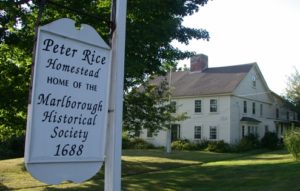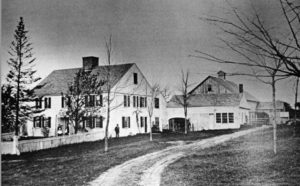
The Peter Rice Homestead has been the home of the Marlborough Historical Society since 1968.
By Brett Peruzzi, Contributing Writer
MARLBOROUGH – The Peter Rice homestead on Elm Street in Marlborough, one of the city’s oldest and most storied residences, is a natural home for the Marlborough Historical Society.
The homestead, which is on a hillside overlooking Mount Wachusett to the west, is believed to date back to 1688, when Peter Rice married Rebecca Howe and brought her to the 17-acre site, bequeathed to him by his father. The first dwelling was likely a much simpler affair, a one or two room house, compared to the expansive two-story building of today. As the family grew, so did the house, as the couple would go on to have 11 children.
Previously a family home for generations

The Peter Rice Homestead in Marlborough, circa 1894
The home remained in the Rice family for six generations – nearly two hundred years. In 1894, it was sold to the Fitch family, who grew numerous vegetable and fruit crops on the property. The Labelle family was the next owner, beginning in 1939, and because of the housing shortage during World War II, the house was divided up into several apartments. In 1967 it was purchased by the Honeywell corporation, who a year later gifted it to the Marlborough Historical Society through a long-term lease. The society was started in 1965 and was in search of a permanent location when it moved to the Rice Homestead, where it has been headquartered ever since. When the society moved into the property in 1968, extensive renovations were necessary, many of which were completed over the next several years by some of the members.
Historic meeting place
The first floor has a large room that is used by the society for meetings, and includes a fireplace that was built over an earlier kitchen fireplace with both a bake oven and ash pit. The present kitchen contains another large antique fireplace and bake oven, while the more modern furnishings are used for preparing baked goods for the society’s events and fundraisers.
Another notable first floor room is known as the West Parlor, which has gone through various changes as the building evolved over the centuries. The fireplace in this room had undergone at least three incarnations before the most recent one, believed to have been installed in the 1940s, was removed to reveal an earlier one.
On the second floor, the room on the left is the John Frye Memorial Room, named after the founder of the shoe factory that bore his name. It is used to display changing exhibits of items from the society’s collection. The display cases are both functional and historic, as they were once used to display playbills outside the Marlborough Theater on Main Street, which was built in the 1920s and razed in the 1970s. A room now used as the curator’s office is where items donated to the society are processed and stored, and where paper items such as maps, manuscripts, and photos are archived, and the society’s library of books is maintained.
An adjoining room is furnished like an old-fashioned schoolroom, with student desks and a teacher’s podium. When children’s groups visit the homestead, they are seated here to learn about what schools were like during the Rice family era. The room was originally a wide open space used for a variety of purposes over the years, including additional sleeping quarters, storage, and as an entrance to the attic. Another room contains other Marlborough memorabilia, including a mantle and chair from the Williams Tavern, which operated in various forms from the late 1600s until the early twentieth century.
Available for public use
The Peter Rice Homestead was placed on the National Register of Historic Places in 1980. The homestead is typically open to the public for monthly programs and special events, and for research and tours with at least 10 days notice; however, the COVID-19 pandemic has introduced restrictions.
For more information about visiting, contact the Marlborough Historical Society by visiting historicmarlborough.org.






